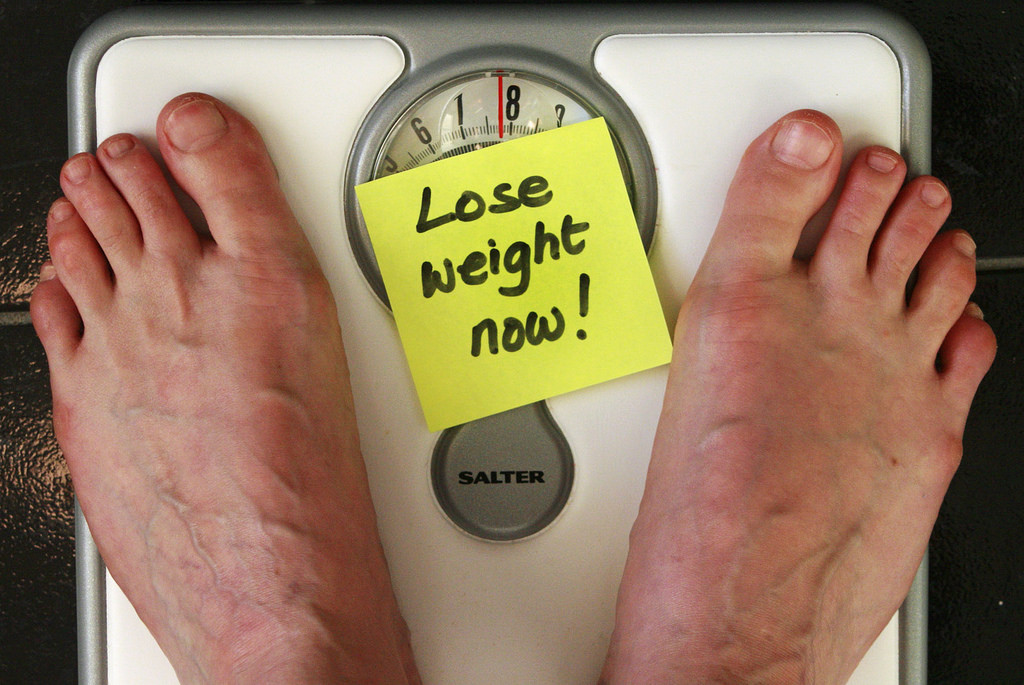Do you need to lose weight? Amino acid derivative 5-HTP may help
Obesity continues to be a major health concern in the western society. The inability to maintain a healthy BMI elevates the risk of type 2 diabetes, heart disease and other complications. With an increased threat of early mortality, losing weight is a major goal for many people.
Unfortunately weight loss is not always easy. Maintaining a healthy diet and regular exercise can be difficult, especially for individuals who are morbidly obese. One of the major challenges is curbing appetite.
The importance of lowering calorie consumption
 At a very basic level, a daily calorie intake that exceeds calorie expenditure will cause weight gain. The more calories consumed and the less exercise preformed, the bigger the weight gain.
At a very basic level, a daily calorie intake that exceeds calorie expenditure will cause weight gain. The more calories consumed and the less exercise preformed, the bigger the weight gain.
In theory, one of the simplest ways to reverse this trend is to eat less. Reducing calories and increasing exercise will support healthy weight loss.
However, a person’s appetite can be very difficult to control. Not only are there physiological aspects, there are also psychological attachments to certain high-calorie foods that can be challenging to overcome.
This is one of the reasons why many people turn to appetite suppressants.
Types of appetite suppressants
There are a whole range of different products on the market formulated to help improve satiety. Some of these are natural, while others are pharmaceutically derived. Commonly prescribed anorexiants include brands such as Phentermine, Phendimetrazine, Diethylpropion, and Burpropion.
These medications affect the brain chemicals such as serotonin and norepinephrine, essentially elevating satiety hormones to promote feelings of fullness. As a result, people eat less. This reduces calorie consumption and supports weight loss.
However, many of these drugs present side effects or can interfere with other medications, making them unsuitable. This is why many people look for natural alternatives. One highly effective option is 5–hydroxytryptophan, commonly abbreviated to 5-HTP.
What is 5-HTP?
5-HTP is the product of the essential amino acid L-tryptophan. It is sometimes referred to as oxitriptan. This compound is a metabolic intermediate and chemical precursor in the biosynthesis of melatonin and serotonin. These qualities make 5-HTP important for regulating mood, appetite and circadian rhythms.
Although 5-HTP is naturally produced in the body, it’s also easily to reproduce as a dietary supplement. One of the commonly utilised natural sources of 5-HTP comes from an African plant called Griffonia simplicifolia1.
How can 5-HTP help with weight loss?
Serotonin is a neurotransmitter produced from 5-HTP. This nervous system messenger has numerous functions in the body. One of the clinical applications of serotonin is in the control of appetite and satiety through selective serotonin reuptake inhibitor (SSRI) medications2.
However, these prescription medications often only have a short-term benefit for most people. A more effective alternative may be increasing the availability of 5-HTP so that the body can more efficiently regulate serotonin levels and subsequently reduce hunger pangs.
What clinical studies have found

Several published double-blind, placebo-controlled studies that have found that 5-HTP is highly effective for promoting satiety and reducing appetite. One of the earliest published studied investigated the effects of 5-HTP on nineteen obese female volunteers3.
For a period of five weeks these subjects were administered a placebo or 8mg/kg/day of oral 5-HTP. No dietary restrictions were imposed. No mood changes were observed. However, volunteers administered 5-HTP reported a reduction in calorie intake, increased satiety, and weight loss.
A subsequent study involving overweight non-insulin dependent diabetic patients found similar results. Volunteers randomly received either 750mg/day of 5-HTP or a placebo for a two week period, with no calorie restrictions. Researchers found that volunteers who received the 5-HTP reduced their carbohydrate and fat intake compared with the placebo group, leading to weight loss4.
Two other more recent studies have involved administering 5-HTP in the form of a herbal oral spray absorbed sublingually. In both studies participants reported an increase in satiety compared with the control group. Also, volunteers receiving 5-HTP lost a significant amount of weight5,6.
Is it safe to take 5-HTP for weight loss?
Most people can safely take this amino acid derivative to help support weight loss. However, anyone taking serotonergic antidepressant medications such as sertraline (Zoloft), paroxetine (Paxil), fluoxetine (Prozac), and others must seek medical approval. Also, certain conditions such as serotonin syndrome should not take 5-HTP.
Will 5-HTP work for me?
Taking a supplement of 5-HTP will not automatically make weight loss easy or sustainable. Research into 5-HTP induced satiety continues and to date all the clinical studies have only involved a small number of volunteers.
Nevertheless, the physiological responses of 5-HTP supplementation do support weight loss. Together with regular exercise and making an effort to sustain a healthy diet, there are good reasons to suggest that 5-HTP supplements will make weight loss easier and sustainable.
References
- “Lemaire P. and Adosraku R. (2002). An HPLC method for the direct assay of the serotonin precursor, 5–hydroxytrophan, in seeds of Griffonia simplicifolia. Phytochemical Annual. Volume 13, Issue 6, (pp. 333–7).” ↩
- “Halford J. et al. (2007). Serotonergic drugs: effects on appetite expression and use for the treatment of obesity. Drugs. Volume 67, Issue 1, (pp. 27–55).” ↩
- “Ceci F, et al. (1989). The effects of oral 5–hydroxytryptophan administration on feeding behavior in obese adult female subjects. Journal Neural Transmission Volume 76, Issue 2, pp. 109–17.” ↩
- “Cangiano C, et al. (1998). Effects of oral 5–hydroxy–tryptophan on energy intake and macronutrient selection in non–insulin dependent diabetic patients.” International Journal of Obesity Related Metabolic Disorders. Volume 22, Issue 7, (pp 648–54).” ↩
- “Rondanelli M, et al (2009). Satiety and amino–acid profile in overweight women after a new treatment using a natural plant extract sublingual spray formulation. International Journal of Obesity. Volume 33, Issue 10, (pp.1174–82).” ↩
- “Rondanelli M, et al (2012). Relationship between the absorption of 5–hydroxytryptophan from an integrated diet, by means of Griffonia simplicifolia extract, and the effect on satiety in overweight females after oral spray administration. Eat Weight Disorder. Volume 17, Issue 1, (pp. 22-8).” ↩




